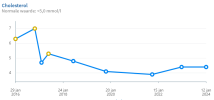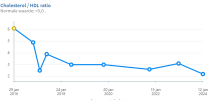HairySmurf
Well-Known Member
- Messages
- 174
- Type of diabetes
- Type 2
- Treatment type
- Tablets (oral)
Hi folks,
I have only recently become interested in controlled nutrition. Up to now I believed in variety, balance and moderation, though in all honesty I wasn't good at the moderation part. My thinking was that if you eat a wide enough variety of food your body will get all the micronutrients it needs along with beneficial doses of things like antioxidants, without having to think too deeply about it. Part of that thinking was eating plenty of foods like pineapple, for the enzymes it contains, and superfoods such as blueberries for all the good stuff those contain.
Since my diagnoses I'm having to rethink all that. I have to choose between excluding foods like pineapple and tightly rationing my blueberry intake, or probably having to accept a higher dose of medication for the rest of my life. It's a daunting prospect.
Are there any particularly good diabetes-specific books out there that address this topic well? Some kind of magic diet recipe which provides every element of every superfood but only involves eating 1g of carbs per day would be ideal Failing that, if you had to pick one nutrition book, which would you recommend?
Failing that, if you had to pick one nutrition book, which would you recommend?
**EDIT: After writing this post I started looking for what I'm after online, trying different language. While doing so that I discovered that the term 'superfood' is a discredited marketing term mostly used to sell more of something. Superfoods are practically a religion for the older members of my wider family. It goes to show how little we/I know about nutrition. Book badly needed!
I have only recently become interested in controlled nutrition. Up to now I believed in variety, balance and moderation, though in all honesty I wasn't good at the moderation part. My thinking was that if you eat a wide enough variety of food your body will get all the micronutrients it needs along with beneficial doses of things like antioxidants, without having to think too deeply about it. Part of that thinking was eating plenty of foods like pineapple, for the enzymes it contains, and superfoods such as blueberries for all the good stuff those contain.
Since my diagnoses I'm having to rethink all that. I have to choose between excluding foods like pineapple and tightly rationing my blueberry intake, or probably having to accept a higher dose of medication for the rest of my life. It's a daunting prospect.
Are there any particularly good diabetes-specific books out there that address this topic well? Some kind of magic diet recipe which provides every element of every superfood but only involves eating 1g of carbs per day would be ideal
**EDIT: After writing this post I started looking for what I'm after online, trying different language. While doing so that I discovered that the term 'superfood' is a discredited marketing term mostly used to sell more of something. Superfoods are practically a religion for the older members of my wider family. It goes to show how little we/I know about nutrition. Book badly needed!
Last edited:









